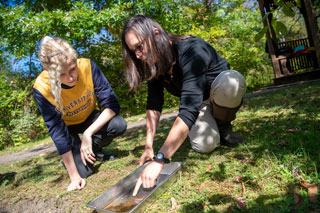Campus adds new major in environmental science
Frantescu to direct program, which begins in January

Next semester, the Pitt-Bradford is launching a new environmental science major that will prepare students to take advantage of an increasing number of jobs protecting the environment.
The new major will draw from courses in biology, chemistry, environmental science, research methods, geology and physics to prepare students for jobs in conservation, hydrology, geoscience, and environmental restoration, science and compliance.
Employment opportunities in the field are expected to increase in part because of the heightened public interest in the challenges currently facing the environment. The U.S. Bureau of Labor Statistics projects job opportunities for environmental scientists and specialists who have at least a bachelor’s degree to grow 8% through 2029 -- much faster than the average for all occupations.
Dr. Ovidiu Frantescu, director of the Allegheny Institute of Natural History at Pitt-Bradford, developed the new program and will serve as its director.
The university has had a major in environmental studies since 2001, which focuses on working within the realm of environmental policy and includes courses in economics, politics, statistics, philosophy and literature. The new environmental science major differs from that major because it requires more courses in science.
Frantescu said he and other professors discovered a trend over the last few years, which illustrated the need for a more science-based major.
Frantescu said they noticed that many students majoring in environmental studies were adding minors in biology, chemistry, environmental science and geology to add depth to their science experience and broaden the kinds of jobs for which they would be eligible.
The new major also includes some geology classes, including a geology teaching collection of rocks, minerals and fossils. Additionally, the university already has the needed faculty, lab and library resources, as well as electronic and measuring equipment.
All of these research tools will come in handy for environmental science seniors, who will each complete a capstone project of original research in the lab or field or in library research. Projects could include geologic mapping, finding fossils and studying them in the lab, or monitoring water or air quality.
Frantescu said that one of the many advantages of Pitt-Bradford’s location is that students can conduct research without leaving the 470-acre campus, which includes a portion of the West Branch of the Tunungwant creek, a swath of wooded hillside, and trees and brush land along the creek.
“We are fortunate to have that creek running right through the campus, because that’s constantly in use as an outdoor laboratory,” he said. The university is also close to the Allegheny National Forest and other forested land.
Students also will be able to take advantage of opportunities provided by the local oil and gas industry, where an increasing emphasis on greener processes and environmental regulation will provide opportunities for research, internships and jobs.
Students in the new major will choose from one of three areas of concentration – physical or biological – or a combination of the two.
In the physical concentration, students will select five or six more geology courses and complete their capstone in that area. The additional courses offered include Meteorology, Petrology, Hydrogeology and Advanced Geographic Information Systems.
For the biology concentration, students will select five or six more biology courses and complete a capstone. Additional courses can include Ethnobotany, Ecology, Field Botany, Entomology and Aquatic Biomonitoring.
Students also have the option of taking a mix of the two and devising an appropriate capstone project.
The new major is one of a suite of options Pitt-Bradford has for studying the environment and energy. Other programs include a two-year associate of science in petroleum technology; bachelor’s degrees in energy science and technology, biology and chemistry; and minors in biology, chemistry, environmental science and geology. Pitt-Bradford is expected to add a major in energy engineering technology in the fall of 2021.
For more information on the environmental science major, contact Frantescu at odf1@pitt.edu or 814-362-5106 or visit https://www.upb.pitt.edu/academics/majors-minors/environmental-science-bs.
--30--